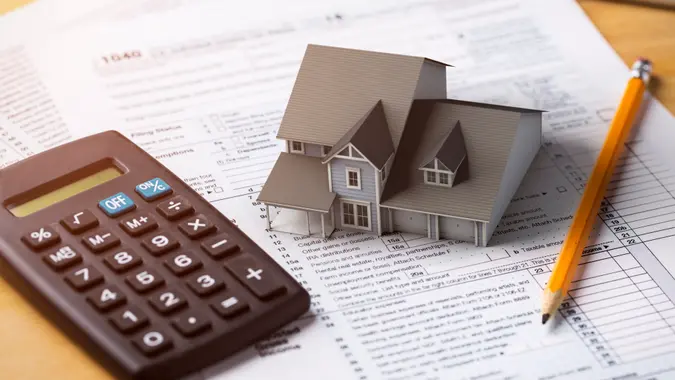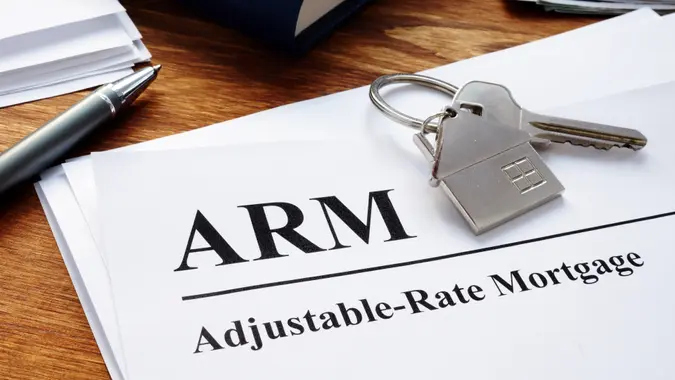When Should You Refinance Your Mortgage? Pros, Cons & Timing Tips

Commitment to Our Readers
GOBankingRates' editorial team is committed to bringing you unbiased reviews and information. We use data-driven methodologies to evaluate financial products and services - our reviews and ratings are not influenced by advertisers. You can read more about our editorial guidelines and our products and services review methodology.

20 Years
Helping You Live Richer

Reviewed
by Experts

Trusted by
Millions of Readers
Refinancing could be a smart financial move if you want to save money on your mortgage. It might help you lower your monthly payment, adjust your loan terms, lock in a better interest rate or tap into your home’s equity.
But when should you refinance your mortgage to make it truly worthwhile?
It’s important to consider the cost of refinancing your mortgage. Otherwise, you might end up paying the closing costs and getting nothing in return.
Let’s break down when to refinance mortgage loans, how soon you can refinance a mortgage and what you should consider before moving forward.
Best Times to Refinance Your Mortgage
So, when should you refinance your mortgage? Below are some scenarios where it would make sense:
1. Interest Rates Have Dropped
You might want to refinance when mortgage rates drop. A lower rate can reduce your monthly payments and might save you thousands over the course of your loan.
Here’s a common rule of thumb: If the new rate is at least 1% lower than your current mortgage rate, refinancing is likely worthwhile.
Even a small drop in your interest rate could be worth it if you plan to stay in your home long enough to break even.
2. Your Credit Score Has Improved
A higher credit score might let you secure a better interest rate and loan terms on your mortgage.
If your credit score has improved since you got your mortgage, refinancing could save you money over the life of the loan.
Some lenders offer rate discounts for certain credit score tiers, so even modest improvements could make a difference.
3. You Want to Lower Your Monthly Payment
Refinancing to get a longer loan term (for example, switching from 15 years to 30 years) could substantially lower your monthly payments.
This could free up cash for savings, investments, extra debt payments or other expenses.
However, keep in mind that extending your loan term typically means you’ll pay more in interest by the end of your mortgage.
4. You Want to Pay Off Your Mortgage Faster
On the other hand, you can also switch to a shorter-term loan (e.g., 15 years instead of 30 years) so you can pay off your mortgage faster.
The monthly payments will likely be higher, but it can save you a lot of interest in the long term.
Paying off your mortgage early could give you peace of mind and free up some of your income for retirement savings or other investments.
5. You Need to Access Home Equity
With a cash-out refinance, you can borrow enough to pay off your current mortgage along with a lump sum of cash.
Many homeowners use the extra money to fund home renovations, consolidate debt, pay for education expenses or invest. So, if you’re wondering, “When should you refinance your mortgage?” and also need some cash, this could be a solid option.
However, you should carefully weigh a cash-out refinance against other options, like a home equity loan or HELOC (home equity line of credit).
6. You Have an Adjustable-Rate Mortgage (ARM) and Want Predictability
Adjustable-rate mortgages usually start with a low introductory rate but can adjust higher after a few years.
When you refinance into a fixed-rate mortgage, you can switch to predictable payments and protect yourself from rising interest rates.
If you plan to stay in your home for the foreseeable future, a fixed rate can offer long-term financial security.
7. You Want to Remove Private Mortgage Insurance (PMI)
If you put down less than 20% when you took out your mortgage, you may still be paying PMI, which can add hundreds of dollars to your annual costs.
Refinancing could eliminate PMI and lower your monthly payment once you have at least 20% equity in your home.
Keep in mind, though, that you might be able to request PMI removal without refinancing, depending on your loan type and lender.
When Refinancing Might Not Be the Right Choice
Alright, we went through some instances when you should refinance your mortgage. Now, let’s look at a few times when refinancing your mortgage isn’t worth it:
- High closing costs: When you refinance, there are generally fees, called closing costs, that you have to pay. Make sure the savings outweigh any closing costs by performing a break-even analysis (more on this later).
- You plan to move soon: If you think you’re going to sell your home soon, it’s typically not worth it to refinance. Refinancing is usually best if you plan to stay in your home long enough to benefit from the lower interest rate or a different term.
- Your credit score has dropped: Lenders generally charge a higher interest rate if you have a low credit score. If your credit score has dropped, you might not get a better rate by refinancing.
- You’re extending your loan term too much: While lowering your monthly payments could free up extra income, extending the term could result in you paying substantially more interest over time.
Key Factors to Evaluate Before Refinancing Your Mortgage
If you’re still wondering, “Should I refinance my mortgage?” here are a few things to consider before refinancing:
- Financial stability: Make sure you have a good credit score, stable income and low debt-to-income ratio (DTI) to qualify for the best loan terms.
- Break-even point: Calculate how many months it will take to recover your closing costs to make sure it’s worth it to refinance.
- Loan term considerations: Decide whether to refinance into a shorter term (for faster payoff and savings) or a longer term (for lower payments).
- Home equity position: If you have at least 20% equity, you may qualify for better terms and avoid PMI.
- Interest rate trends: Keep an eye on mortgage rates to ensure you’re refinancing at the most optimal time.
- Lender comparison: Always get multiple quotes from different lenders so you can compare the best combination of interest rates, fees and loan terms.
How Soon Can You Qualify for Mortgage Refinancing?
So, how soon can you refinance a mortgage after you take out the loan? It depends on what type of mortgage you have:
- Conventional loans: Some lenders let you refinance immediately, while others may require a six-month waiting period.
- FHA loans: You have to wait at least 210 days (about seven months) after closing on the original loan before you can refinance.
- VA loans: After 210 days (about seven months) and six on-time monthly payments, you may be eligible for a VA streamlined refinance.
- Jumbo loans: There are typically stricter requirements, with many lenders requiring 12 months of on-time payments before refinancing.
A couple of important considerations:
- If your home’s value has declined, refinancing may be more challenging unless you have significant equity.
- Some lenders charge prepayment penalties (fees for paying off the loan early), which could negate any savings from refinancing.
| Loan Type | Waiting Period | Notes |
|---|---|---|
| Conventional | 0-6 months | Some lenders require six payments |
| FHA | 210 days | At least six on-time payments needed |
| VA | 6 months | Six on-time payments required |
| Jumbo | 12 months | Stricter lender rules apply |
| Home Value | Varies | Low equity may delay approval |
| Prepayment Fees | Varies | Some loans have early payoff fees |
How Much Does It Cost to Refinance a Mortgage?
When you refinance, you’ll likely have to pay closing costs, typically ranging between 2% and 6% of your loan amount. Closing costs often include:
- Lender fees (origination, underwriting, application fees)
- Third-party costs (appraisal, credit report, title insurance, recording fees)
- Prepaid costs (property taxes, homeowners insurance, escrow account funding)
However, there are a few ways you can try to reduce your refinancing costs:
- Shop around and compare lenders to find the lowest fees
- Try to negotiate fees with the lender or ask for lender credits
- Look for no-closing-cost refinancing offers (although these might roll the cost into your loan or charge higher interest rates)
How Much Can You Save by Refinancing?
The amount you can save from a refinance depends on your current loan terms, interest rate and the new loan structure.
Let’s look at an example to show how much you could potentially save:
Original loan:
- $250,000 at 6% interest ??’ $1,500 monthly payment
Refinanced loan:
- $250,000 at 4% interest ??’ $1,200 monthly payment
By refinancing in this scenario, you could save $300 per month or $3,600 per year.
However, when deciding when should you refinance your mortgage, always conduct a break-even analysis.
The break-even point is the moment when the amount you saved from refinancing outweighs the amount you spent on the costs to refinance.
For example, if refinancing costs $5,000 and your monthly savings are $200, it would take 25 months (just over two years) to recover the costs.
So, if you plan to stay in your home longer than 25 months, it could be time to refinance your mortgage. However, if you’re going to move before then, refinancing would cost you money.
Mortgage Refinancing: Pros and Cons
Below are some pros and cons to weigh if you’re still unsure when to refinance mortgage loans.
| Pros | Cons |
|---|---|
| Lower monthly payments | High closing costs |
| Pay off mortgage faster | May take years to break even |
| Access home equity | Pay off the mortgage faster |
| Switch from an ARM to a fixed rate | Credit score impact from new loan inquiry |
| Remove PMI | Not ideal if you’re planning to move soon |
Final Thoughts to GO: Is Refinancing Right for You?
If you’re asking “When should you refinance your mortgage?”, the answer depends on your current rate, credit profile, and financial goals. Refinancing can offer big savings — but only if the math checks out.
Refinancing could be worth it if you lock in a better rate, lower your mortgage payments or pay off the loan sooner.
If you’re weighing when should you refinance your mortgage, though, always calculate your break-even point before making a decision.
Remember: Not shopping around is one of the most costly mistakes when refinancing your mortgage. Taking the time to compare lenders and understand the fees can help you choose the best refinancing option and maximize your savings.
FAQs About Mortgage Refinancing
Here are some tips, tricks and common questions to help you figure out when should you refinance your mortgage:- How much does it cost to refinance a mortgage?
- While it varies depending on the lender and your location, refinancing typically costs between 2% and 6% of the loan amount.
- How long does refinancing take?
- The timeline to refinance depends on your lender and loan type, but it could take between 30 and 45 days.
- Can I refinance if my home’s value has dropped?
- Yes, but your options may be limited. You may need more equity or a government-backed refinance, like an FHA or VA loan.
- Will refinancing hurt my credit score?
- Due to the hard credit inquiry, there may be a slight, temporary drop in your credit score after refinancing.
- Is it better to refinance or get a home equity loan?
- It depends. If you want to lower the overall cost of your mortgage, refinancing could be the way to go. However, a home equity loan may be a better option if you want to access a large sum of cash.
Information is accurate as of May 13, 2025.
Editorial Note: This content is not provided by any entity covered in this article. Any opinions, analyses, reviews, ratings or recommendations expressed in this article are those of the author alone and have not been reviewed, approved or otherwise endorsed by any entity named in this article.
Our in-house research team and on-site financial experts work together to create content that’s accurate, impartial, and up to date. We fact-check every single statistic, quote and fact using trusted primary resources to make sure the information we provide is correct. You can learn more about GOBankingRates’ processes and standards in our editorial policy.
- Experian "How Does Refinancing a Mortgage Work?"
- Experian "When Should You Refinance Your Mortgage?"
- U.S. Department of Housing and Urban Development "Adjustable Rate Mortgages (ARM)"
- Consumer Financial Protection Bureau "What is private mortgage insurance?"
- Consumer Financial Protection Bureau "When can I remove private mortgage insurance (PMI) from my loan?"
- Experian "How Much Does It Cost to Refinance a Mortgage?"
- Consumer Financial Protection Bureau "What fees or charges are paid when closing on a mortgage and who pays them?"
 Written by
Written by  Edited by
Edited by 
























